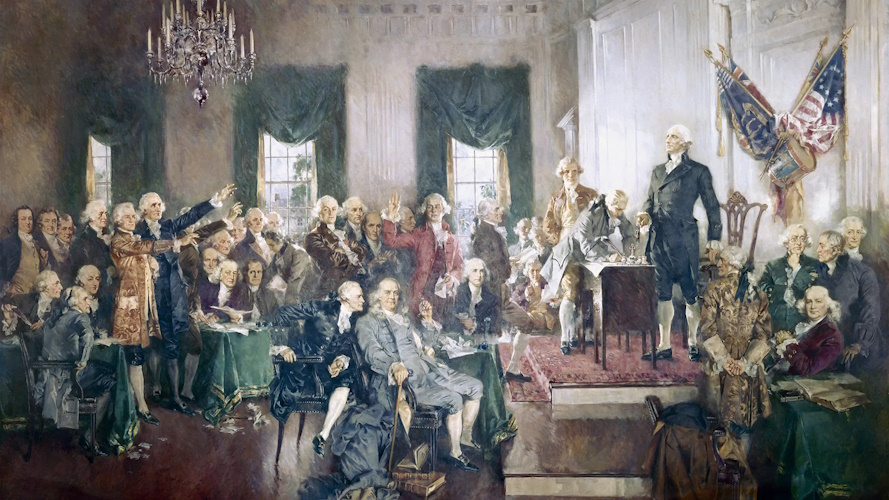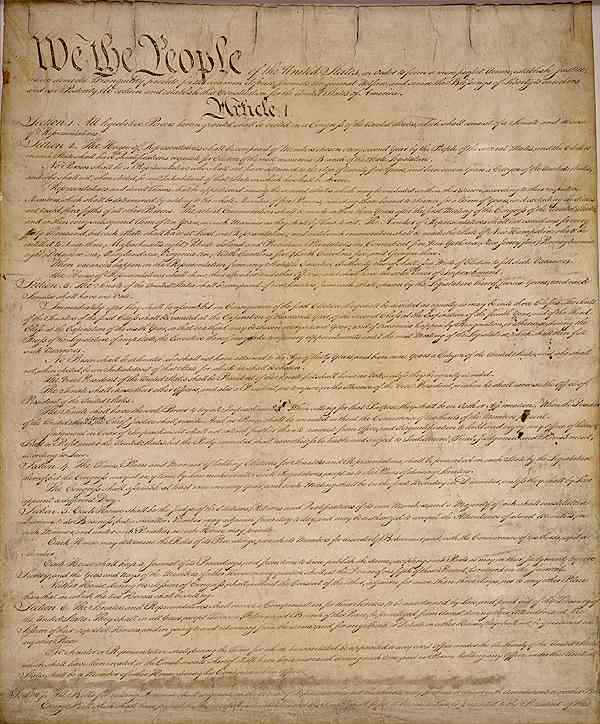
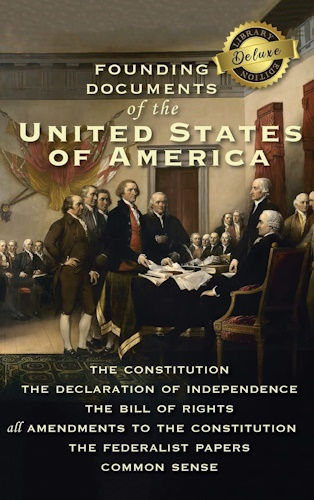
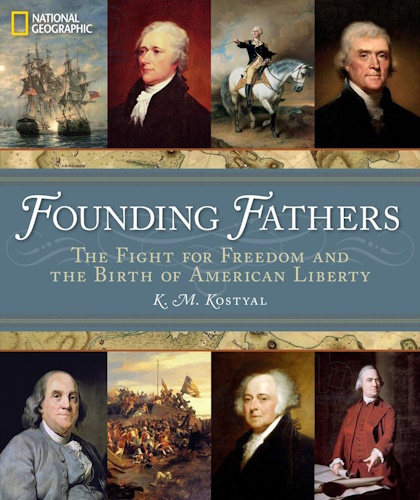
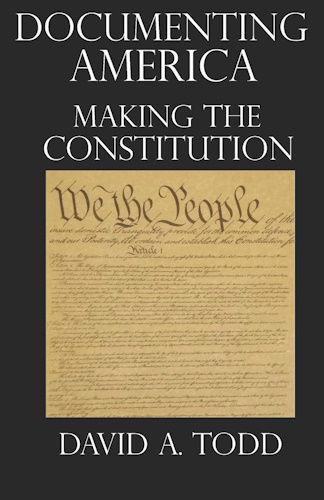


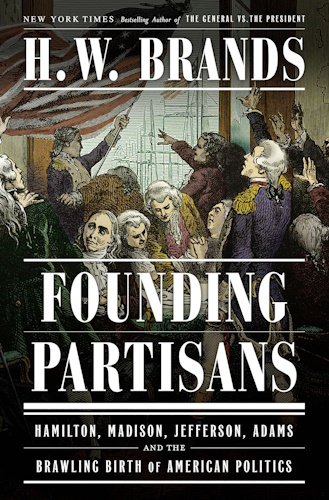
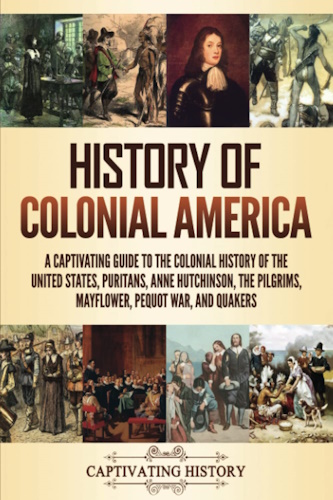
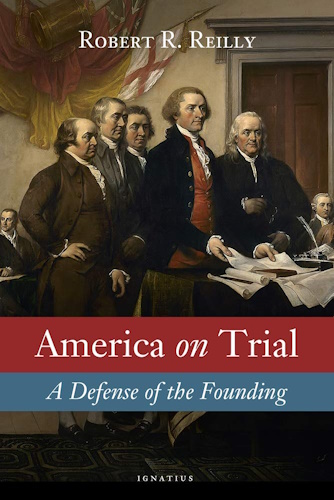
The Constitution For The United States
Its Sources and Its Application
by Thomas James Norton
(Retrieved from archive.org)
The research, work, and dedication
Of
Barefoot Bob Hardison
August 8th, 1933 - January 31st, 2009
![]()
The Constitution For The United States
Its Sources and Its Application
Contents
Preamble
Article 1
Article 2
Article 3
Article 4
Article 5
Article 6
Article 7
Ratification
1st 12 Amendment Proposals
"Bill of Rights" Amend. I - X
Amend. XI -XXVII
Missing Original 13th Amendment
Letter of Transmittl
Landmark Court - Case Index
Constitution History
A Quiz for Loyal Americans
Index
Article V
The Congress, whenever two-thirds of both Houses shall deem it necessary, shall propose Amendments to this Constitution, or, on the Application of the Legislatures of two-thirds of the several States, shall call a Convention for proposing Amendments, which, in either Case, shall be valid to all Intents and Purposes, as part of this Constitution, when ratified by the Legislatures of three-fourths of the several States, or by Conventions in three-fourths thereof, as the one or the other Mode of Ratification may be proposed by the Congress; 129
129 In this Article there is prevented for the future one of the failures in practice of the Articles of Confederation. They provided (Article XIII) that no alteration at any time should be made unless agreed to in the Congress of the United States "and be afterward confirmed by the legislature of every State." Three important attempts to amend the Articles failed on account of that provision for unanimity. Rhode Island alone prevented an amendment by which the Government could raise money on import duties. New York alone defeated another amendment for a general revenue plan. A third important amendment thus defeated related to commerce. The framers of our Constitution removed that obstacle.
Here, for the first time in history, a government provided for its own change without turbulence or bloodshed.
All the Amendments to the Constitution thus far adopted were proposed by Congress and not by the legislatures of the States; and only one ratification (that of Amendment XXI) has been effected by conventions rather than by State legislatures. The Constitution itself was ratified137, not by the legislatures, but by conventions of the people in the States. New Jersey ratified the Fourteenth Amendment on September 11, 1866, and attempted on March 27, 1868, to rescind its action; and in January, 1868, Ohio attempted to rescind its ratification of that Amendment, which was given on January 11, 1867. Secretary of State Seward announced the ratification of the Fourteenth Amendment by three fourths of the States, and mentioned those attempts at rescission. Congress thereupon passed a concurrent resolution that the ratifications made the Amendment a part of the Constitution. Oregon tried to withdraw its ratification of the Fourteenth Amendment after its adoption had been proclaimed by the Secretary of State. New York undertook to withdraw its ratification of the Fifteenth Amendment. The governing principle seems to be that when the legislature took the step of ratifying under the Constitution it exercised its constitutional authority, exhausted its power in the premises, and could do nothing further.
In 1919 the Supreme Judicial Court of Maine, in answer to a question propounded by the Governor, declared that the legislature could not rescind its ratification of the Eighteenth Amendment, establishing prohibition.
In 1920, in six cases, arising in New Jersey, Rhode Island, Massachusetts, Kentucky, Wisconsin, and Missouri under the Eighteenth Amendment, the Supreme Court of the United States held that the referendum provisions in the constitutions of some States cannot be applied under this article to the ratification or rejection of amendments - the requirement being that the legislature, or a convention, and not the voters, must ratify or reject an Amendment.c4, c76, c93
On December 20, 1860, South Carolina, in the State convention, repealed or withdrew the ratification of the Constitution which it gave in 1788 and undertook to return to its former status.
Praising our Constitution as superior to that of England because time and consideration are required to make an amendment, Lecky ("Democracy and Liberty") says that "an appetite for organic change is one of the worst diseases that can affect a nation."
Fenet, the French statesman, in making a report for the revision of the law of France and the adoption of a civil code, and having in mind the failure of the French Revolution in its effort to take leave of past thought and achievement and to set up a new social and governmental system based upon supposedly new ideas, gave expression to this maxim, which should not be forgotten: "It is better to preserve what it is not necessary to destroy."
In his Farewell Address (1796), caution is given by Washington to resist "the spirit of innovation" upon the principles of the Constitution, "however specious the pretexts." He said that "facility in changes upon the credit of mere hypothesis and opinion exposes to perpetual change from the endless variety of hypothesis and opinion"; and that in any event, should a "modification of the Constitutional powers" be necessary, it should be made "by an amendment in the way which the Constitution designates." "But let there be no change by usurpation," he warned.
Every one of the twelve constitutions of France adopted since 1789 has been made difficult to amend. To illustrate, one provided that no amendment could be made until three successive legislative assemblies should have expressed the wish for a change in some article.
The Parliament of Australia can alter certain articles but not others. The Parliament of the Dominion of Canada cannot change the constitution, which is alterable by the Parliament of England. But in New Zealand almost all the articles are amendable by the local Parliament.
In the Argentine Republic, which followed our Constitution closely, amendments are first declared by a two-thirds vote of Congress to be necessary, and then the subject is dealt with in a convention for the purpose.
In Brazil, as with us, amendments may be initiated by either Congress or the legislatures of the States.
From time to time Presidents have suggested to Congress the propriety of proposing amendments to the Constitution. Jefferson, who had questioned the constitutional power to make the purchase of Louisiana in 1803, suggested to Congress (1806) that an amendment be proposed authorizing the spending of surplus National funds for education throughout the States, for the construction of roads, the opening of rivers and the digging of canals. President Monroe suggested (1817) the propriety of an amendment authorizing the establishment of seminaries throughout the land. In 1829 President Jackson recommended an amendment permitting the distribution of surplus National revenue among the States so as to avoid what he considered the illegal appropriation of public money for non-National purposes. On December 3, 1860, the month after Lincoln was elected, President Buchanan asked Congress to propose an "explanatory amendment"167-3
(1) recognizing property in slaves where they then were held or might afterward be owned;
(2) protecting the right of slave owners to hold slaves in Territories, the right thereafter to be determined by a vote of the people; and
(3) recognizing the right of an owner to his fugitive slave and declaring all State laws void which were designed to impair or defeat his rights.
In 1868 President Johnson asked Congress to propose an amendment for the election of the President by the direct vote of the people, limiting his term to six years, and forbidding reelection. President Grant desired (1873) an amendment authorizing the President to veto any item of a bill to which he might object without negativing the whole bill; and in 1882 President Arthur made a like request, calling the attention of Congress to the fact that fourteen States had at that time made such provision for the veto of legislative bills by their governors. President Grant also (1873) requested the proposal of an amendment that a special session of Congress be forbidden to deal with any subject except that for which it had been specially convoked.
To illustrate how closely the applicability of the Constitution has always been studied it may be mentioned that from April to November, 1921, there were offered in the first session of the Sixty-seventh Congress twenty-five resolutions to amend it, some of them being substantially repetitions of others. One was for making the term of the President six years and prohibiting his reelection; another would authorize him to veto any provision of a bill and approve the remaining ones; another would empower Congress to regulate the employment of children under sixteen years of age45; another would extend the word "elections" in the Constitution to include primaries26; another would submit to a vote of the people the question of declaring war55; another would extend the constitutional definition of treason113 to include acts of injury in time of war to the military, physical, or financial resources of the United States; another would require the ratification of an Amendment by the voters of the country to the exclusion of the legislatures of the States; and more of various kinds. It has been said that over 2000 amendments have been proposed in the course of our National life.
Provided that no Amendment which may be made prior to the Year One thousand eight hundred and eight shall in any Manner affect the first and fourth Clauses61, 65 in the Ninth Section of the first Article;130
130 This relates to slavery.
and that no State, without its Consent, shall be deprived of its equal Suffrage in the Senate.131
131 Once more the small State is guaranteed against being prejudiced by the large ones. In the Brazilian Constitution it is provided that bills to abolish the republican federative form of government, or to destroy equality of representation in the Senate, are not.
![]()
![]()
![]()
Disclaimer:
Some material presented will contain links, quotes, ideologies, etc., the contents of which should be understood to first, in their whole, reflect the views or opinions of their editors, and second, are used in my personal research as "fair use" sources only, and not espousement one way or the other. Researching for 'truth' leads one all over the place...a piece here, a piece there. As a researcher, I hunt, gather and disassemble resources, trying to put all the pieces into a coherent and logical whole. I encourage you to do the same. And please remember, these pages are only my effort to collect all the pieces I can find and see if they properly fit into the 'reality aggregate'.
Personal Position:
I've come to realize that 'truth' boils down to what we 'believe' the facts we've gathered point to. We only 'know' what we've 'experienced' firsthand. Everything else - what we read, what we watch, what we hear - is what someone else's gathered facts point to and 'they' 'believe' is 'truth', so that 'truth' seems to change in direct proportion to newly gathered facts divided by applied plausibility. Though I believe there is 'truth', until someone representing the celestial realm visibly appears and presents the heavenly records of Facts And Lies In The Order They Happened, I can't know for sure exactly what "the whole truth' on any given subject is, and what applies to me applies to everyone. Until then I'll continue to ask, "what does The Urantia Book say on the subject?"
~Gail Bird Allen
![]()
![]()








-
Urantia Book, 44:0.11 - The Celestial Artisans
Never in your long ascendancy will you lose the power to recognize your associates of former existences. Always, as you ascend inward in the scale of life, will you retain the ability to recognize and fraternize with the fellow beings of your previous and lower levels of experience. Each new translation or resurrection will add one more group of spirit beings to your vision range without in the least depriving you of the ability to recognize your friends and fellows of former estates.
-
Princess Bride 1987 Wallace Shawn (Vizzini) and Mandy Patinkin (Inigo Montoya)
Vizzini: HE DIDN'T FALL? INCONCEIVABLE.
Inigo Montoya: You keep using that word. I do not think it means what you think it means. -
Urantia Book, 117:4.14 - The Finite God
And here is mystery: The more closely man approaches God through love, the greater the reality -- actuality -- of that man. The more man withdraws from God, the more nearly he approaches nonreality -- cessation of existence. When man consecrates his will to the doing of the Father's will, when man gives God all that he has, then does God make that man more than he is.
-
Urantia Book, 167:7.4 - The Talk About Angels
"And do you not remember that I said to you once before that, if you had your spiritual eyes anointed, you would then see the heavens opened and behold the angels of God ascending and descending? It is by the ministry of the angels that one world may be kept in touch with other worlds, for have I not repeatedly told you that I have other sheep not of this fold?"
-
Urantia Book, Foreword - 0:12.12 - The Trinities
But we know that there dwells within the human mind a fragment of God, and that there sojourns with the human soul the Spirit of Truth; and we further know that these spirit forces conspire to enable material man to grasp the reality of spiritual values and to comprehend the philosophy of universe meanings. But even more certainly we know that these spirits of the Divine Presence are able to assist man in the spiritual appropriation of all truth contributory to the enhancement of the ever-progressing reality of personal religious experience—God-consciousness.
-
Urantia Book, 1:4.3 - The Mystery Of God
When you are through down here, when your course has been run in temporary form on earth, when your trial trip in the flesh is finished, when the dust that composes the mortal tabernacle "returns to the earth whence it came"; then, it is revealed, the indwelling "Spirit shall return to God who gave it." There sojourns within each moral being of this planet a fragment of God, a part and parcel of divinity. It is not yet yours by right of possession, but it is designedly intended to be one with you if you survive the mortal existence.
-
Urantia Book, 1:4.1 - The Mystery Of God
And the greatest of all the unfathomable mysteries of God is the phenomenon of the divine indwelling of mortal minds. The manner in which the Universal Father sojourns with the creatures of time is the most profound of all universe mysteries; the divine presence in the mind of man is the mystery of mysteries.
-
Urantia Book, 1:4.6 - The Mystery Of God
To every spirit being and to every mortal creature in every sphere and on every world of the universe of universes, the Universal Father reveals all of his gracious and divine self that can be discerned or comprehended by such spirit beings and by such mortal creatures. God is no respecter of persons, either spiritual or material. The divine presence which any child of the universe enjoys at any given moment is limited only by the capacity of such a creature to receive and to discern the spirit actualities of the supermaterial world.
-
Urantia Book, 11:0.1 - The Eternal Isle Of Paradise
Paradise is the eternal center of the universe of universes and the abiding place of the Universal Father, the Eternal Son, the Infinite Spirit, and their divine co-ordinates and associates. This central Isle is the most gigantic organized body of cosmic reality in all the master universe. Paradise is a material sphere as well as a spiritual abode. All of the intelligent creation of the Universal Father is domiciled on material abodes; hence must the absolute controlling center also be material, literal. And again it should be reiterated that spirit things and spiritual beings are real.
-
Urantia Book, 50:6.4 - Planetary Culture
Culture presupposes quality of mind; culture cannot be enhanced unless mind is elevated. Superior intellect will seek a noble culture and find some way to attain such a goal. Inferior minds will spurn the highest culture even when presented to them ready-made.
-
Urantia Book, 54:1.6 - True And False Liberty
True liberty is the associate of genuine self-respect; false liberty is the consort of self-admiration. True liberty is the fruit of self-control; false liberty, the assumption of self-assertion. Self-control leads to altruistic service; self-admiration tends towards the exploitation of others for the selfish aggrandizement of such a mistaken individual as is willing to sacrifice righteous attainment for the sake of possessing unjust power over his fellow beings.
-
Urantia Book, 54:1.9 - True And False Liberty
How dare the self-willed creature encroach upon the rights of his fellows in the name of personal liberty when the Supreme Rulers of the universe stand back in merciful respect for these prerogatives of will and potentials of personality! No being, in the exercise of his supposed personal liberty, has a right to deprive any other being of those privileges of existence conferred by the Creators and duly respected by all their loyal associates, subordinates, and subjects.
-
Urantia Book, 54:1.8 - True And False Liberty
There is no error greater than that species of self-deception which leads intelligent beings to crave the exercise of power over other beings for the purpose of depriving these persons of their natural liberties. The golden rule of human fairness cries out against all such fraud, unfairness, selfishness, and unrighteousness.

